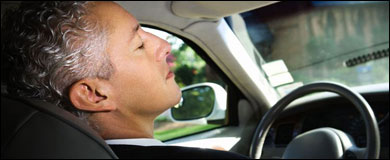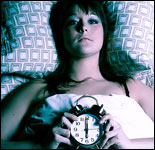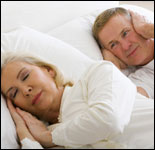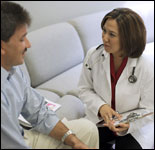Recognize Symptoms for Sleep Disorders
 Sleep disorders are not just phantoms of the night. It's not normal to feel sleepy during the daytime, to have problems falling asleep or staying asleep, or to wake up in the morning feeling unrefreshed. These are signs to talk about with your doctor.
Sleep disorders are not just phantoms of the night. It's not normal to feel sleepy during the daytime, to have problems falling asleep or staying asleep, or to wake up in the morning feeling unrefreshed. These are signs to talk about with your doctor.
Sleep. Like the weather, that's one topic on which everyone has an opinion. How often do you hear friends and family complaining they don't get enough sleep? Or talking about what a hard time they had falling asleep the night before? Maybe you're one of those people who has trouble staying asleep, or perhaps you get a full night's sleep but you just don't feel refreshed when you get up in the morning. These complaints may signal a treatable sleep disorder or simply reflect not getting enough sleep. Either can cause serious health problems.
 You won't be surprised to learn that a recent CDC study of metropolitan, urban and rural Georgia populations found that many people have trouble staying awake during the day. The real news is that 16 percent of Georgia's residents experience persistent problems staying awake during the day, but only 10 percent reported having been diagnosed with a sleep disorder.
You won't be surprised to learn that a recent CDC study of metropolitan, urban and rural Georgia populations found that many people have trouble staying awake during the day. The real news is that 16 percent of Georgia's residents experience persistent problems staying awake during the day, but only 10 percent reported having been diagnosed with a sleep disorder.
This study analyzed interview data from almost 7,000 randomly selected adults who participated in the Georgia Chronic Fatigue Syndrome (CFS) surveillance study. Because people with CFS may complain of problems sleeping, the study also evaluated sleep.
In addition to problems staying awake, the study also found that:
- 33 percent report that they snore,
- 25 percent complain that they have problems falling asleep,
- 31 percent cannot sleep through the night, and
- 35 percent of Georgians wake up in the morning feeling unrefreshed.
It's well understood that your quality of life decreases when you're sleepy. Excessive daytime sleepiness can also greatly increase the risk of accidents on the highways and at work. Insufficient sleep and primary sleep disorders are associated with many serious chronic diseases such as diabetes, hypertension, cardiovascular disease and stroke. Click here to listen to a CDC podcast on how undiagnosed sleep problems may lead to long- term health issues. (Sleep Disorders: Not Just Phantoms of the Night ![]() 6:16 mins).
6:16 mins).
Know the Signs and Symptoms of Sleep Disorders
 Daytime sleepiness is one of the most common signs of a sleep related disorder. People often attribute daytime sleepiness to aging, lack of exercise or being overworked. For these and many other reasons, people live with persistent daytime sleepiness without realizing that it may be a symptom of a sleep disorder. Other signs and symptoms of sleep-related disorders include:
Daytime sleepiness is one of the most common signs of a sleep related disorder. People often attribute daytime sleepiness to aging, lack of exercise or being overworked. For these and many other reasons, people live with persistent daytime sleepiness without realizing that it may be a symptom of a sleep disorder. Other signs and symptoms of sleep-related disorders include:
- Snoring that is accompanied by pauses in breathing,
- Loud or disruptive snoring,
- Difficulty falling asleep and/or staying asleep,
- Awakening from sleep and feeling unrefreshed or with a headache,
- Creepy crawling sensations in the legs or arms during evening hours,
- Physically acting out dreams during sleep.
What Can You Do? 
A sleep disorder can exist for weeks to years before a person recognizes it. It's not normal to always feel sleepy during the daytime or have problems falling asleep, staying asleep, or awakening unrefreshed. These are signs to as talk about with your doctor.
Be prepared with information about your sleep patterns and provide your doctor with as much supporting information as possible. You may need to ask your bed partner to find out if you snore or kick during the night. Tell your doctor if you're waking up with a dry mouth, snore, experience morning headaches, can't sleep or awaken night from in the middle of the night, or experience a tingling in your legs during the evening.
Many people are predisposed to developing sleep disorders. If you think that your bed partner has signs of sleep disorder, then let him or her know as he or she may be unaware if it. Sleep disorders also exist in children. A parent with a sleep disorder often passes along those genes or traits that increase the likelihood that their children may also develop the same disorder.
More Information
- Chronic Fatigue Syndrome
- Sleep and Sleep Disorders: A Public Health Challenge
- National Center on Sleep Disorders Research
- Sleep Research Society*
- Hypersomnolence and Sleep-related Complaints in Metropolitan, Urban, and Rural Georgia. American Journal of Epidemiology, 2008. doi:10.1093/aje/kwn365*
- American Academy of Sleep Medicine*
- American Sleep Apnea Association*
- American Insomnia Association*
- Restless Legs Foundation*
- Narcolepsy Network*
Current Features
Need info on a
different topic? See


